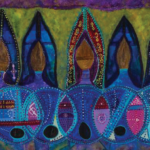Five questions for Kim Kierans on teaching journalists in the Philippines
Every summer for the last six years, Kim Kierans has travelled to the Philippines to teach working journalists new skills and help them develop old ones. Angelina Irinici finds out what unique challenges these journalists face in terms of ethics and press freedom and why Kierans’ biggest desire is to become obsolete.
Every summer for the last six years, Kim Kierans has travelled to the Philippines to teach working journalists new skills and help them develop old ones. Angelina Irinici finds out what unique challenges these journalists face in terms of ethics and press freedom and why Kierans’ biggest desire is to become obsolete.
J-Source: So you’ve been teaching in the Philippines for six years now and also teach journalism at the University of King’s College in Halifax. Why the Philippines – how did you get started there?
Kim Kierans: I had spent three sessions doing training in Cambodia with a Canadian NGO. I worked with a journalist doing broadcast, radio skills and reporting and getting ready for them to cover elections. Anyway, after that I came back to Canada to continue to teach at King’s (I only went in the summer time), I got an email from the Asian Centre for Journalism in the Philippines asking me if I’d like to teach. And it was online teaching. I was familiar with the program, but I said no the first time. I didn’t have time — I was busy teaching here at King’s. They asked again and the timing was better and I said yes. I taught online the first time — a broadcast issues course. I had never been in a chat room (she laughs) and I learned a lot! It was very new and I became hooked.
I thought, at first, that teaching online would be so impersonal and you wouldn’t get to know the students. I thought I’d have to see them in the classroom and look at them in the eye, but it was very interesting because quickly their personalities came through because we did live chats. All of sudden people had personalities and then when I met them on campus they were exactly as I thought they would be.
Then they had a diploma program at the time on radio so I went and taught and developed a course for that. I started supervising Masters’ theses and I’ve supervised Masters’ theses from Thailand, Cambodia, Philippines, India — all over the place. I think I’ve learned more than I’ve contributed to their education sometimes.
J-Source: How do you find teaching a class in the Philippines of students from all over Asia compared to teaching journalism at the University of King’s College here in Canada?
KK: Well, the journalists I’m teaching are all practicing journalists in the Master’s program in the Philippines so they all come with a level of experience and expertise. They have a real desire to learn – not that I’m saying Canadian students don’t have a desire to learn — there’s a real sense that they are one of the lucky ones that actually get the opportunity to be post-grads. The other thing is that it’s funded through the Konrad Adenauer-Stiftung out of Germany — so a high percentage of these students are fellows so their tuition and travel are paid for. You can imagine that working in most Asian countries as a journalist is probably one of the lowest paying professions. A lot of the time they are talking about how you do ethical journalism when you’re not being paid enough to feed your family and there’s huge pressure to take bribes to write good stories. This is an ongoing source of conversation.
J-Source: Can you talk about the state of press freedom and journalists’ safety in the country and how this may affect the way you teach?
[node:ad]KK: We have students from Vietnam, Cambodia, China, Myanmar, even Thailand and Malaysia where there are restrictions on press freedom. In Thailand you can’t write about the King for instance, in Vietnam it’s a controlled press and in the Philippines if you’re controversial and wanting to uncover corruption you might very well become a target. So those are real issues that they talk about.
I remember going to the Philippines right after the Mindanao massacre and one of my students from Mindanao said, “how can I cover this trial and the investigation into these murders when ten of my friends were murdered? How can I do that?” My Vietnamese students ask how they can write about the government without losing their job, or worse, going to jail. So, this whole thing about can you only do good journalism in a democracy is really being debated right now. These are questions that are being discussed and there are various forms of answers.
These students are becoming more responsible — they’re becoming more aware of their responsibilities as storytellers and they’re having to navigate some really difficult waters. My hope is that, as they become the sort of managers of media companies or the leaders of education in their own countries that the seeds that have been planted will help to bring about more reform and a freer press.
J-Source: With your role at King’s during the school year and then going to teach abroad during the summer you’re obviously quite busy and don’t get much of a summer holiday. So, what keeps you going back each year?
KK: It’s the inspiration that I get from looking at many, many courageous journalists who are trying to improve the quality of journalism in the countries they come from. And my goal is to make myself obsolete so that some year they’ll just say, “We don’t want you, Kim” and I’ll say, “Yay!”
I’m really working on them in the classrooms. I give them all my materials and say you have to go back to your newsrooms or go back to you classrooms in your own country and you have to become leaders and the teachers. I really want them to take ownership of their education and be able to spread it and work with young journalists and mentor them. And, you see results: I had one student from this year in Indonesia; he was doing “lunch and learns” at his newspaper from what he learned on campus. Another grad is becoming the director of media and communications at the Royal University of Phnom Penh.
After seeing this happen you want to be obsolete. At least that’s what I want.
J-Source: Do you have a favourite story or memory from teaching this past summer?
KK: After I finished at the Philippines I went to Cambodia and I have two Master’s students from Phnom Penh and they were both working on a story. All three of us went out in the field together and one was doing a story about a so-called resort outside of Phnom Penh and the garbage problem there. One of the happiest moments was when we were at this resort and I was sitting back just watching. One student asked the other: “What are you asking them? What are you going to do”? He was working with her to strategize who she needs to talk to and what she needs to ask. He had taken over a role normally I would have taken on and I didn’t ask him to. And that to me was one of the best moments of my working with the students.
Kim Kierans is the vice president of The University of King's College in Halifax, NS and was the director of its School of Journalism prior to that, from 2003 to 2010. In addition to her administrative duties now, Kierans teaches a number of undergraduate journalism classes. The photo above is Kierans being interviewed by one of her students, Kc Bhuwan from Katmandu, Nepal at Ateneo de Manila University in Philippines, July 2012. Photo by JM Nualla.





